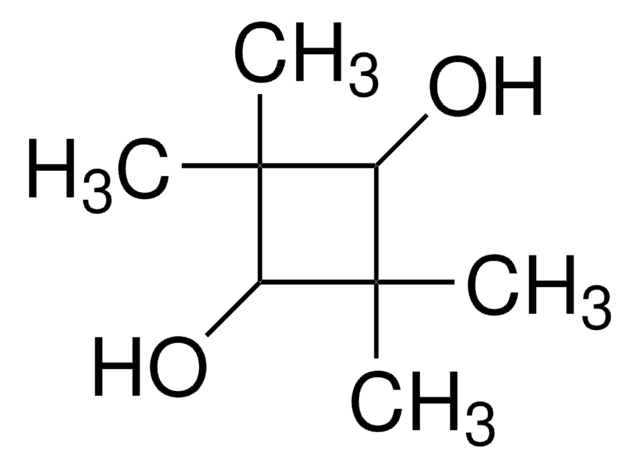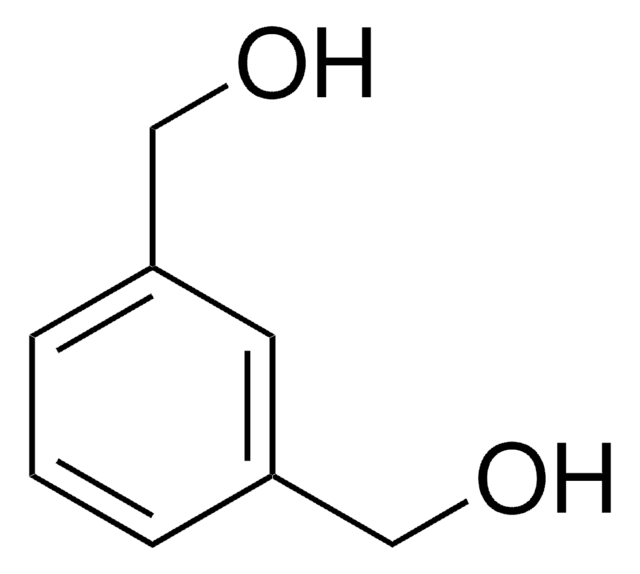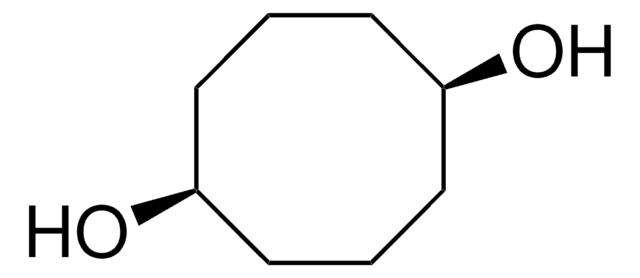125598
1,4-Cyclohexanedimethanol
mixture of cis and trans, 99%
Synonym(s):
1,4-Bis(hydroxymethyl)cyclohexane, mixture of cis and trans
Sign Into View Organizational & Contract Pricing
All Photos(4)
About This Item
Linear Formula:
C6H10(CH2OH)2
CAS Number:
Molecular Weight:
144.21
Beilstein:
1902271
EC Number:
MDL number:
UNSPSC Code:
12352100
PubChem Substance ID:
NACRES:
NA.22
Recommended Products
vapor density
5 (vs air)
Assay
99%
autoignition temp.
584 °F
bp
283 °C (lit.)
SMILES string
OCC1CCC(CO)CC1
InChI
1S/C8H16O2/c9-5-7-1-2-8(6-10)4-3-7/h7-10H,1-6H2
InChI key
YIMQCDZDWXUDCA-UHFFFAOYSA-N
Related Categories
General description
1,4-Cyclohexanedimethano is extensively used as cross-linking reagent in polymer industry.
Application
1,4-Cyclohexanedimethanol has been used in the synthesis of polyketal copolymers. It was used as diol comonomer during the synthesis of polyester-carbonates based on 1,3-propylene-co-1,4-cyclohexanedimethylene succinate.
Signal Word
Danger
Hazard Statements
Precautionary Statements
Hazard Classifications
Eye Dam. 1
Storage Class Code
11 - Combustible Solids
WGK
WGK 1
Flash Point(F)
321.8 °F - closed cup
Flash Point(C)
161 °C - closed cup
Personal Protective Equipment
dust mask type N95 (US), Eyeshields, Gloves
Certificates of Analysis (COA)
Search for Certificates of Analysis (COA) by entering the products Lot/Batch Number. Lot and Batch Numbers can be found on a product’s label following the words ‘Lot’ or ‘Batch’.
Already Own This Product?
Find documentation for the products that you have recently purchased in the Document Library.
Customers Also Viewed
New biodegradable polymers from renewable sources: Polyester-carbonates based on 1, 3-propylene-co-1, 4-cyclohexanedimethylene succinate.
Liu Y, et al.
Journal of Polymer Science Part A: Polymer Chemistry, 39(14), 2508-2519 (2001)
Stephen C Yang et al.
Bioconjugate chemistry, 19(6), 1164-1169 (2008-05-27)
Acute inflammatory diseases are a major cause of death in the world, and effective treatments are greatly needed. Macrophages play a central role in causing acute inflammatory diseases, and there is currently great interest in developing drug delivery vehicles that
Mingliang Ding et al.
Biodegradation, 23(1), 127-132 (2011-07-07)
Enzymatic hydrolytic degradation of polybutylene succinate (PBS), poly(polybutylenesuccinate-co-1,4-cyclohexane dimethanol) (PBS/CHDM) and poly(polybutylene succinate-co-diglycolic acid) (PBS/DGA) in mixed solvent of tetrahydrofuran (THF) and toluene was examined. Lipase was used as catalyst to degrade polymers with molecular weight of more than 100,000
Zehong Xiang et al.
Macromolecular bioscience, 19(8), e1900112-e1900112 (2019-06-22)
Inflammation-associated thrombosis is a non-negligible source of mortalities and morbidities worldwide. To manipulate inflammation-associated coagulation, nanoparticles that contain anti-inflammatory polymer (copolyoxalate containing vanillyl alcohol, PVAX) and anti-thrombotic heparin derivative deoxycholic acid (Hep-DOCA) are prepared. The strategy takes advantage of the
Single-step conversion of dimethyl terephthalate into cyclohexanedimethanol with Ru5PtSn, a trimetallic nanoparticle catalyst.
Ana B Hungria et al.
Angewandte Chemie (International ed. in English), 45(29), 4782-4785 (2006-06-24)
Our team of scientists has experience in all areas of research including Life Science, Material Science, Chemical Synthesis, Chromatography, Analytical and many others.
Contact Technical Service

![4,8-Bis(hydroxymethyl)tricyclo[5.2.1.02,6]decane, mixture of isomers 96%](/deepweb/assets/sigmaaldrich/product/structures/973/006/555dc1f2-c191-4d54-9aea-19fd4c3544a2/640/555dc1f2-c191-4d54-9aea-19fd4c3544a2.png)




![Tricyclo[5.2.1.02,6]decanedimethanol diacrylate](/deepweb/assets/sigmaaldrich/product/structures/327/536/0dc81542-b920-47ec-99c1-d064a327a315/640/0dc81542-b920-47ec-99c1-d064a327a315.png)





